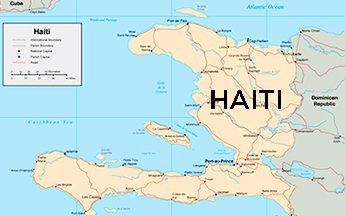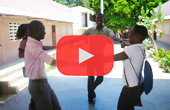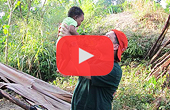Mobile clinics, staffed by School of Nursing and Health Studies graduate students, faculty, and alumni, deliver primary care services to remote areas of Haiti.
While volunteering in December 2013 at one of Project Medishare’s mobile clinics in a village outside of Thomonde, Haiti, Michael Bartuseck, M.S.N. ’14, and Johis Ortega, B.S.N. ’02, M.S.N. ’06, Ph.D. ’10, encountered a young man with a large abscess in his upper arm. They weren’t equipped to perform any minor surgeries that day, so they started him on antibiotics and asked if he could find transportation to Thomonde the following day, where Project Medishare has a small office.
Bartuseck, then a student in the Family Nurse Practitioner program at the School of Nursing and Health Studies, and Ortega, assistant professor of clinical and director of international programs at the school, converted one of Project Medishare’s workstations into a patient room. They drained the abscess using whatever supplies they could gather while the patient reclined on a desk.
“It was my first invasive procedure, and it’s something I will never forget,” says Bartuseck, now a nurse practitioner in a Miami orthopedic surgery practice. “I learned more in a week than I could have ever imagined.”
Twice a year, Ortega leads a team of about 20 graduate students, faculty, and alumni of the School of Nursing and Health Studies on mission trips to Thomonde, located in the nation’s Central Plateau. By setting up mobile clinics in remote locations and knocking on doors of nearby huts, the nurses provide medications, hygiene products, and primary care services for some 150 patients a day.
“We travel by car for 45 minutes to reach people in the mountains who otherwise must walk four or five hours to reach a street,” Ortega says. “We often see parents with 10 to 15 kids, but there are no grandparents. Most people there don’t have a very long life expectancy. We bathe the babies and bring them clothes and shoes. I had one patient with a blood pressure of 220/110 who was ready to have a stroke.”
Haitian doctors and nurses travel with the SONHS team into the rural communities, where they shadow the volunteers.
“As nurses, we love to teach,” say Ortega, noting that educating local health care workers on how to provide quality care despite a lack of resources is the most important aspect of his team’s mission.












